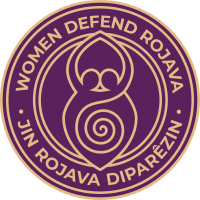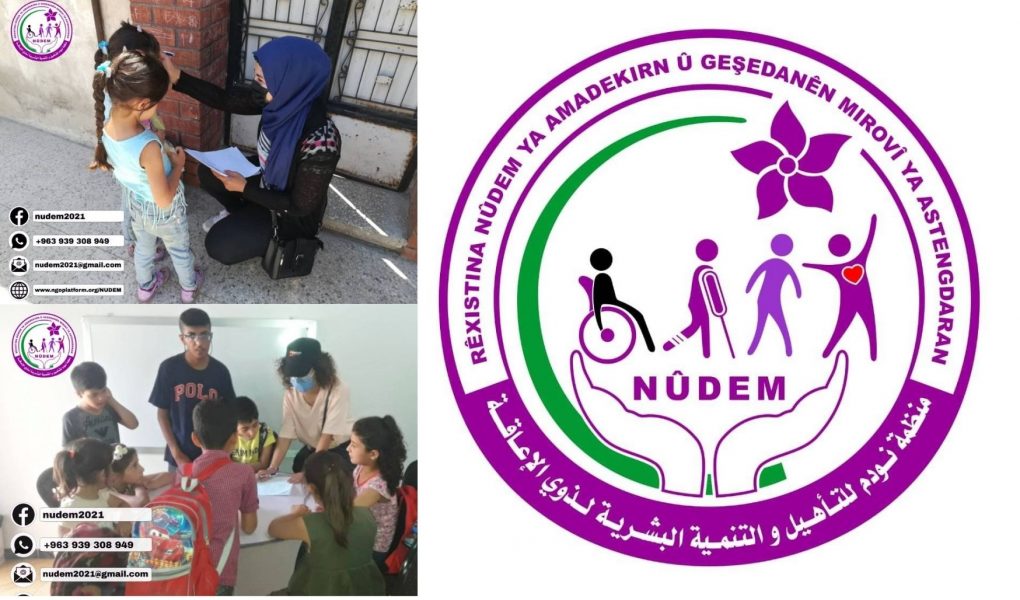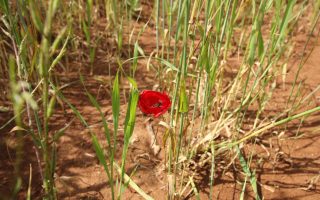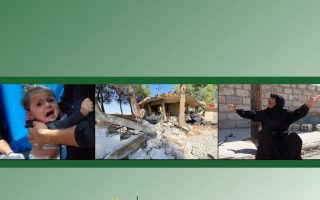Nûdem organisation
We interviewed Cihan Reşîd an activist and spokesperson for the organisation ‘Nûdem – Care and Support for People with Disabilities’. Nûdem is an organisation that works for the self-determination of people with disabilities. The activist has a disability herself and has been fighting for a better life for people with disabilities for years.
1. Can you briefly introduce your organisation? What is the aim of the organisation?
We are a group of volunteers who have been campaigning for disability rights and equality for over three years. And so, this year, we decided to create the organisation Nudem in order to strengthen our work and to be able to support the people concerned more effectively through our work. The board of Nudem consists of 7 people and I am the spokesperson. On the board, 2 people with disabilities take their place. Each member is responsible for different committees.
We strive to integrate disabled people into society. We want to create awareness in society that disabled people exist. That they are full members of society and that society also has the responsibility to support them.
To educate society, we offer different types of education. One is for people with disabilities, for their families and for people who work with people with disabilities. Through regular home visits, we try to find out what people with disabilities need in their daily lives and support them where it is needed. So we also get into a close exchange with the families, we have some projects that provide material support, e.g. hearing aids, walking aids and the like, and we try to enable people to work independently through training. And we try very hard to coordinate between the regional and international organisations and institutions working for disabled people in the region.
2. Where does your work take place?
We are active all over northern and eastern Syria.
And our centre is in Qamishlo, but we are working on setting up centres in different places. And we are currently looking for a new location, as the current one is an improvised solution.
3. What are the problems at the moment? And what are your approaches to solving them?
As we are an independent organisation and receive no outside support, the problems we face are mostly financial. The people we visit and who ask us for help often also need material and financial support. However, since our financial resources are very limited, we are often unable to help. We have helpful people who volunteer with us and we have worked with many families and people with disabilities over the years, documenting their needs and wishes. We have also developed many ideas and projects, but without funding it is very difficult to implement them.
Educating and taking care of the families on an emotional level is a very important step, but if there is then a lack of material help for the daily means to remedy the impairment for a barrier-free life, the families’ trust in the organisation also dwindles.
Therefore, we approach the institutions of the autonomous administration of Northern and Eastern Syria and various organisations dealing with the same issue for support. So we often receive material and logistical support or use their premises to organise trainings, but of course this is not enough.
4. How is the approach of society and families towards people with disabilities? Is there discrimination?
As I said earlier, an important part of our work is to educate society and create awareness that people with disabilities are equal members of society and deserve equal opportunities. But unfortunately, when we visit families, we still too often find that this awareness raising is a difficult and lengthy job.
There are families who are convinced that their child is not capable of working and that he or she will not find employment anywhere anyway, and who do not let him or her try, so that he or she stays in the house and is kept away from society. On the other hand, families are often afraid to let their children, young or old, out of the house for fear that they will be laughed at or harmed by society. Unfortunately, there are still people who do not accept people with disabilities and exclude them from society.
Most people we talk to don’t know how to get support for their disabled children or family members, and because they don’t know how to support them, it is often neglected. That is why it is important for us to publicise different centres where families can get support for their children’s treatment. As families often have too little knowledge on many issues, this leads to further limitations.
We hear many stories that make the problem in society very clear. One story is that of a 14-year-old girl, which we met during one of our home visits and in discussions with the family. The girl has a physical disability and can only move one arm and one leg with difficulty. Her mother told us that she only sent her daughter to school for 3 months because she had difficulty going to school every day. It was not impossible, just difficult. With such problems, it is important to understand that the difficulties she has in going to school cannot be compared in many other areas of her future. Now her child cannot read or write because the family itself did not have the opportunity to teach her at home. Such an approach leads to people with disabilities having even more hurdles to independent living. We want to change that!
5. can you name a few ideas/projects that are planned for the future or are coming up in the near future?
Our daily work has shown us that there are still many areas to work on. We have prepared some projects that we want to realise in the near future, because there is an urgent need.
We would like to set up a centre for physiotherapy, as many who depend on it cannot afford it, as physiotherapy is usually too expensive for them. We want such a centre to offer treatments.
We are working to establish a centre for psychological counselling for people with disabilities and people who live with disabled people. It often brings a psychological burden for the people with disabilities and for the family members, because there is also discrimination by the society and some people feel sorry for people with disabilities and this puts a burden on the psyche.
We will also set up an education centre for children with Down syndrome and autism, because children with Down syndrome and autism are often not accepted in mainstream schools.
We also have training in various fields such as computer science, hairdressing, sewing and more on our programme so that they can pursue independent work and earn their own living in the future.
The families of people with disabilities have asked for health education in the communities so that they can treat their children from home when needed, for example, they can give the child an injection at home and not have to go to the doctor every time because it is very expensive when the children need it every day.
6. You are not only an activist for disabled people, but you were born with a disability yourself. Can you describe your situation and do many people with disabilities work with you?
Yes, that’s right, myself have gone through many difficulties. After several operations, I am now a little better. Apart from me, there are other people with disabilities who work at the Nudem organisation. A friend who works on the board of the organisation is missing an arm and another friend who works as a volunteer has problems with her legs. In our chater, it was decided that people with disabilities have priority in taking up leadership roles and employment in our organisation.
Contact:
Facebook: nudem2021
whatsapp: +963939308949
mail: [email protected]
www.ngoplatform.org/NUDEM
Nudem Webseit is comming soon!!!




